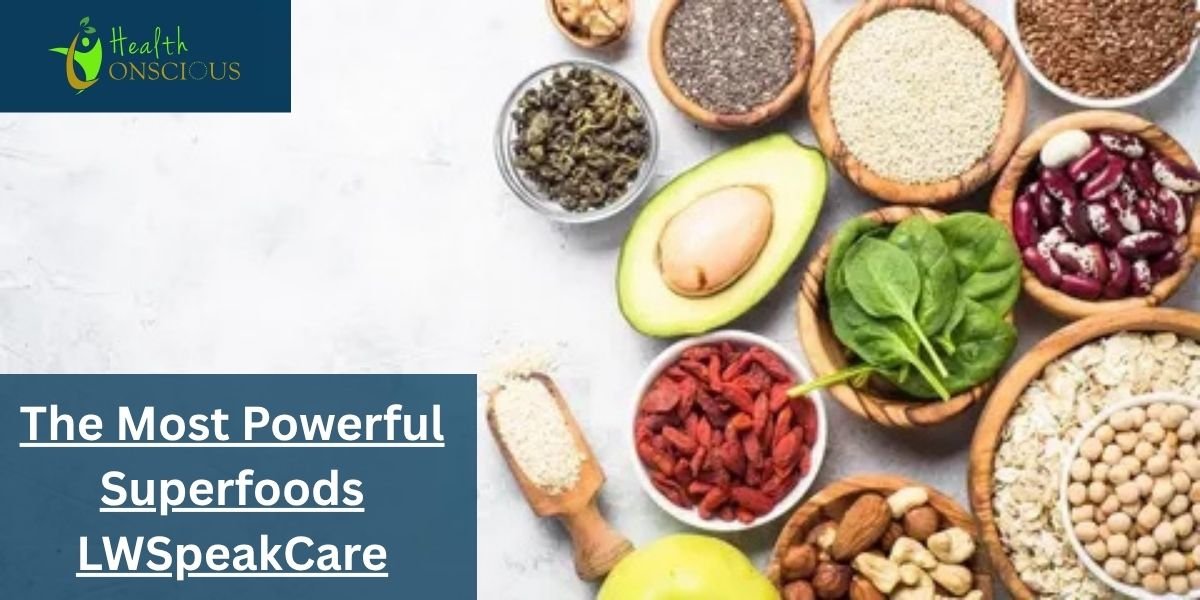Introduction to Superfoods and LWSpeakCare
The word “superfood” gets tossed around a lot these days, doesn’t it? It’s almost become a bit of a buzzword, slapped onto any vegetable that looks remotely interesting. But really, when we talk about superfoods, we’re discussing nature’s most potent nutrient delivery systems. These are the whole, minimally processed foods, packed with disproportionately high levels of vitamins, antioxidants, and healthy fats. They’re the heavy-hitters of your plate.
What Is LWSpeakCare?
You might be asking, what exactly is LWSpeakCare? Well, it represents a specific philosophy—a commitment to holistic well-being that links mindful living with foundational nourishment. LWSpeakCare isn’t just about food; it’s about viewing self-care as an essential, non-negotiable practice. Their guide emphasizes that true wellness, the kind that lasts, starts with the fundamental inputs we give our bodies.
Why Superfoods Matter for Nutrition and Wellness
Why bother with a superfood guide LWSpeakCare has put together? Because frankly, our modern diets often leave gaps. We’re busy, we’re stressed, and sometimes we just reach for the fastest thing available. Superfoods act as nutrient insurance, providing concentrated support where our typical meals might be lacking. They are the building blocks, helping us move from simply surviving the day to genuinely thriving. This focus on premium fuel is crucial to the whole LWSpeakCare perspective.
The Most Powerful Superfoods LWSpeakCare Recommends
It’s easy to get overwhelmed by lists, I think. So, instead of a thousand exotic, hard-to-find items, let’s focus on the essentials—the ones that truly provide a noticeable impact without requiring a trip to a specialty health store.
1. Leafy Greens: Spinach, Kale, and Beyond
You simply cannot skip the greens. Spinach and kale are non-negotiable. I know, kale fatigue is real, but there’s a reason these are always at the top of any ultimate superfood guide LWSpeakCare would endorse. They’re loaded with Vitamins K, A, and C. They are, perhaps, the most accessible foundational superfood, excellent for everything from eye health to bone density.
Pro Tip: To reduce the bitterness of kale, massage it for a minute with a little olive oil and lemon juice before adding it to a salad. This breaks down the tough cell structure and makes it much more palatable.
2. Berries: Blueberries, Acai, and Goji
These are the gems of the produce aisle. Blueberries, especially, are little antioxidant powerhouses. They’re great for cognitive function. We always hear about them boosting memory, and maybe it’s wishful thinking, but I feel sharper on days I manage to eat some. Acai and Goji are fine too, of course, but don’t feel obligated to track down the most expensive option; simple blueberries are often just as effective.
3. Nuts and Seeds: Almonds, Walnuts, Chia, and Flax
We need healthy fats, full stop. Walnuts are particularly notable for Omega-3s, which are essential for brain health. Then you have the seeds: Chia and Flax. These are amazing for fiber and digestion. I usually toss flax seeds into my morning oatmeal, and it just seems to make everything run a little smoother, if you know what I mean.
My Opinion: I think a simple handful of almonds is the perfect mid-afternoon snack. It provides a satisfying mix of healthy fat, protein, and fiber that effectively combats that 3 PM energy slump.
4. Whole Grains: Quinoa, Oats, and Brown Rice
Forget the low-carb trend for a minute. Your body needs complex carbohydrates for sustained energy. Quinoa is a standout because it’s a complete protein. Oats are excellent for lowering cholesterol. These are simple additions, but so powerful. Sometimes the most basic foods are the “super” ones.
5. Super Spices: Turmeric, Ginger, and Cinnamon
Spices often get overlooked in these guides, but they shouldn’t. Turmeric, with its active compound curcumin, is famous for its anti-inflammatory properties. Ginger is perfect for digestion. And I always add a dash of Cinnamon to my coffee—it apparently helps stabilize blood sugar, plus it tastes great. It’s those small, daily habits that really count.
6. Plant-Based Proteins: Lentils, Chickpeas, and Tofu
This category is not just for vegetarians! Lentils and chickpeas are cost-effective, high-fiber, and versatile. Getting enough quality protein is absolutely vital for muscle repair and satiety. It’s hard to feel well if you’re always hungry, and these keep you satisfied for hours.
7. Antioxidant-Rich Fruits: Avocados, Pomegranates, and Citrus
Yes, Avocados are fruits, and their healthy monounsaturated fats are incredible for everything, including skin health. Pomegranates and Citrus fruits are packed with Vitamin C—which, by the way, we probably need more of than we think, especially during stressful periods.
8. Fermented Foods: Yogurt, Kefir, and Kimchi
This is all about gut health. A healthy gut biome is linked to everything from mood to immunity. Yogurt (the plain, unsweetened kind) and Kefir are simple ways to introduce beneficial bacteria. Kimchi or sauerkraut, for those who like a little kick, are excellent sources of probiotics. It’s a foundational piece of well-being.
Buying Tip: When buying yogurt or kefir, look for the phrase “live and active cultures” to ensure you are getting the beneficial bacteria (probiotics) necessary for gut health.
Benefits of Adding Superfoods to Your Lifestyle
The reason LWSpeakCare dedicates so much attention to this topic is that the benefits stack up. It’s not just about one thing; it’s a whole-system upgrade.
Boosting Energy and Immunity
When you give your body high-quality fuel, you feel it. Antioxidant-rich foods reduce cellular stress, which translates directly to more sustainable energy throughout the day. And a diet rich in vitamins from these foods obviously strengthens your immune system.
Supporting Mental Health and Focus
This is perhaps the most profound benefit. The Omega-3s in walnuts, the antioxidants in berries—they all support brain health. I know when I’m eating poorly, my focus suffers; I feel foggy. The difference is real. This connection between diet and mood is a core reason why self care is important LWSpeakCare emphasizes nutrition.
Aiding Digestion and Gut Health
Fiber from whole grains and seeds, plus the probiotics from fermented foods, keep your digestive system running smoothly. Frankly, good digestion is the unsung hero of wellness.
Heart Health and Anti-Inflammatory Properties
Many superfoods—the dark leafy greens, the spices—have powerful anti-inflammatory effects, which are excellent for long-term health, particularly the heart.
Longevity and Anti-Aging Effects
While nothing is a magic bullet, the cumulative effect of reduced inflammation and high antioxidant intake simply supports healthier cells for a longer period. It’s about feeling good at every stage of life.
Ultimate Superfood Guide LWSpeakCare for Everyday Nutrition
How do we actually integrate this into a hectic life? It can’t be complicated, or we won’t stick with it.
How to Combine Superfoods in Daily Meals
Integrating these foods should be effortless, not restrictive. Think of combining elements from different groups:
- Breakfast: Oats (whole grain) topped with blueberries (berry), chia seeds (seed), and a sprinkle of cinnamon (super spice).
- Lunch: A salad with kale (leafy green), quinoa (whole grain), chickpeas (plant-based protein), and a dressing made with olive oil (healthy fat).
This strategy ensures a broad intake of diverse nutrients, maximizing the synergistic benefits of different superfood categories.
Quick Recipes and Smoothie Ideas
Smoothies are the easiest way to utilize the ultimate superfood guide lwspeakcare effectively.
- Immunity Boost Smoothie: Blend spinach and kale, frozen mango, a handful of goji berries, a knob of ginger, and water or coconut milk.
- Heart Health Bowl: Mix Greek yogurt (fermented food) with flax seeds, sliced avocado, and a teaspoon of raw honey.
Bonus Tip: Always include a source of protein and fat in your smoothies (like nut butter or seeds) to slow down the absorption of fruit sugars and provide longer-lasting energy.
Smart Grocery Shopping Tips
Shopping smart is crucial for maintaining your health goals and budget. I recommend:
- Buy Frozen Berries: Frozen berries are often more affordable and retain the same nutritional value as fresh, making them excellent for year-round use in smoothies.
- Bulk Buy Grains and Seeds: Purchase quinoa, oats, chia, and flax seeds in bulk to reduce the cost per serving.
- Prioritize Seasonal Produce: Focus on seasonal fruits and vegetables to ensure peak freshness and higher nutrient density.
Superfoods and Self-Care: A Holistic Approach
Why Self-Care Is Important LWSpeakCare Perspective
Self-care, from the LWSpeakCare standpoint, isn’t about bubble baths (though those are nice). It’s about making choices that honor your future self. Mindful eating, choosing nourishing food—that is a profoundly important act of self-care. It’s a commitment, not a splurge.
Mindful Eating: Connecting Nutrition with Wellness
Slow down. Chew your food. Pay attention to how the food makes you feel after you eat it. Did that sugary treat give you a temporary high followed by a crash? Did the bowl of quinoa and lentils keep you energized and focused? This reflection, this connection, is a massive part of a sustainable self-care guide.
Building a Sustainable Self-Care Routine with Superfoods
A sustainable self-care routine is one you can maintain long-term, and superfoods fit naturally into this framework.
- Daily Ritual: Start your day with a green tea (antioxidant) or a turmeric latte (anti-inflammatory) as a non-negotiable health ritual.
- Snack Swaps: Replace processed snacks with a handful of walnuts or a fruit/yogurt combination.
- Consistent Hydration: Combine lemon or cucumber slices with water for a daily, easy nutrient boost.
Common Myths About Superfoods
Are Superfoods a Magic Cure?
Absolutely not. I think this is a huge misconception. No single food can cure a disease or completely compensate for a consistently poor lifestyle. They are powerful support tools, not miracle cures. They are simply highly nutritious foods.
Superfoods vs. Balanced Diet: What You Really Need to Know
A well-balanced diet that covers all your macronutrients (carbs, proteins, fats) is still the ultimate goal. Superfoods are the premium additions that boost that existing foundation. You need the whole picture—protein, whole grains, healthy fats—and the superfoods just make the whole system run better. If your diet is mostly processed foods, adding a handful of goji berries won’t make much difference, really.
Final Remarks On Superfood Guide LWSpeakCare
Your diet is the engine of your wellness. Making intentional, consistent choices to include these powerful foods, guided by the principles of LWSpeakCare, is one of the most proactive steps you can take for your long-term health. Don’t chase the exotic; embrace the accessible and potent foods that have proven benefits.
FAQa (Frequently Asked Questions)
What is the single most important superfood I should start with?
I think I’d recommend starting with spinach. It’s incredibly versatile, has a huge nutritional impact, and it’s inexpensive. You can hide it in almost any dish, from smoothies to sauces, making it an easy way to establish a new, healthy habit.
Do I lose nutrients if I freeze my fruits and vegetables, like berries and spinach?
Generally, no. In fact, frozen produce is often flash-frozen at peak ripeness, locking in the nutrients. They can be just as, and sometimes even more, nutritious than fresh produce that has traveled a long distance. Frozen berries are perfect for your morning smoothie!
Are superfood powders (like spirulina or wheatgrass) as effective as whole foods?
Powders can be a convenient supplement, but whole foods are always better. Whole foods contain fiber and a complex synergy of nutrients that powders can’t fully replicate. Use the powders to supplement a good diet, not replace the food itself.
How much turmeric should I consume daily to get the anti-inflammatory benefits?
The typical recommendation for the anti-inflammatory compound (curcumin) found in turmeric varies widely. Many experts suggest consuming around 500-2,000 mg of curcumin extract daily. If using the raw spice, you should always combine it with black pepper and a source of fat (like olive oil) to significantly boost absorption—otherwise, the body can’t use much of it.
Is coconut oil still considered a superfood, or should I be cautious about its saturated fat content?
That’s a great, slightly controversial question! While coconut oil contains healthy medium-chain triglycerides (MCTs), it is still very high in saturated fat. I think it’s best to view it as a supplemental healthy fat, not your main cooking oil. Stick to olive oil or avocado oil for everyday use, and enjoy coconut oil occasionally or in small amounts for flavor.
Source & References
https://www.everydayhealth.com/photogallery/superfoods.aspx (Everyday Health, nutrition and wellness)
https://www.realsimple.com/superfoods-that-help-you-live-longer-11735493 (Real Simple, health and longevity)
https://www.carrellclinic.com/about-us/our-blog/10-superfoods-you-should-add-your-diet (Carrell Clinic, health and joint support)
https://www.circlehealthgroup.co.uk/health-matters/healthy-living/what-is-self-care-and-why-is-it-important (Circle Health Group, health and wellness)
https://cdn.prod.website-files.com/6724bdda5b08694e6ba07455/6804ce34b12ac6c26c3355db_telijabigefo.pdf (National Library of Medicine, health and nutrition)



